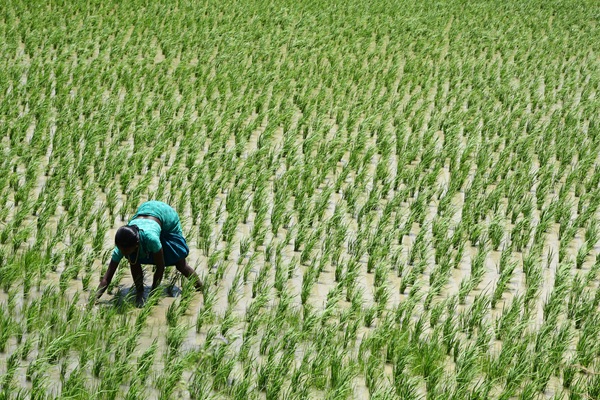.png)
Prosperous Farms, not Farmhouses, Will Keep Children Happy
We romanticise farmhouse retirements but treat farming with apathy. This hypocrisy is hurting our kids.


Kirti Tarang Pande is a psychologist, researcher, and brand strategist specialising in the intersection of mental health, societal resilience, and organisational behaviour.
August 30, 2025 at 12:07 PM IST
Makhana is the best friend of every toddler mom of my generation. We may forget to keep lipgloss in our handbag but we never leave the house without a box of ghee-roasted makhanas. This makes Rahul Gandhi’s recent spotlight on its supply chain so jarring. Bihar cultivates 90% of the world's makhana, yet the farmers who grow it see a fraction of its final value.
This story echoes beyond Makhanas from the hinterlands of Bihar to the fields of Vidarbha. The hand that feeds the nation often struggles to feed its own family. It doesn’t feel fair, does it? But I am not here to talk about social failing or systemic blindspot. I want to talk about its direct impact on the happiness of our urban children.
What if I told you that helping farmers helps us too? What if I told you that securing prosperity for that farmer is a strategic investment that we can make in our children's mental well-being? Yes, it’s true! The answer lies in a concept we psychologists are increasingly researching on, called the "Nature Bath."
As global healthcare systems buckle under weight, the search for effective, preventative solutions has never been more urgent. The science behind ‘nature baths’ offers a compelling, and often overlooked, answer.
This is the practice of immersive, mindful connection with natural environments. It is not about hiking or exercise. It is about sensory engagement; the smell of soil after rain, the sound of birdsong, the visual rest of greenery. Our research shows this practice significantly reduces stress, anxiety, depression, lowers cortisol, and supports immune function by increasing natural killer cell activity.
Some studies find benefits such as improved sleep, increased energy, and faster recovery from illness, attributable in part to substances like phytoncides released by plants. Regular contact with nature decreases activity in the amygdala — the brain's primal threat detection center, enhances mood, focus, and cognitive function such as memory and attention. The participants of these studies reported increased happiness, improved self-esteem, and overall better quality of life after practicing nature bathing. It is a free, preventative mental health intervention. But it requires access to green spaces, which are vanishing from our congested cities.
This is where the solution to farmers’ plight becomes our solution as well. How? I will tell you. But, first, I need you to do an experiment. Ask 10 friends if their ultimate dream is to retire to a farmhouse. Watch the hands go up. Our collective dream isn't just escapism; it is a genetic memory of this vital connection, a need we see even in our children's fascination with nature as they obsessively play ‘Grow a Garden’ and ‘99 Nights in Forest’ on Roblox.
They crave that link to the soil. The Biophilia Hypothesis tells us that humans have an innate need to seek connections with nature and other forms of life, and that losing this connection undermines emotional health.
We can fulfill this need by making the working agricultural landscape accessible and prosperous. Imagine school immersion programmes where urban children practice nature baths in working fields. Imagine peri-urban farms where families volunteer, connecting mental wellness directly to the dignity of agricultural work. This is not a luxury. It is a necessity for raising resilient, less anxious children. Because Attention Restoration Theory has shown us how natural environments help restore mental focus, and that disconnection leads to mental fatigue and lowered wellbeing. Stress Reduction Theory has taught us that natural environments act as a balm for the overstimulated modern brain, restoring our focus and lowering our stress levels to prevent the psychological suffering that our urban environments often exacerbate.
For this to happen, farming must be lucrative.
This brings us back to where we started — the plight of the farmers. Since black and white movies, the narrative of the struggling farmer is a tired national trope, yet a new story is emerging in our news feed these days- one where youth with high-brow degrees are quitting their plush jobs and turning to agriculture as a venture for innovation and profit.
With a global food crisis looming, strengthening agriculture in India is not just a cultural return but also an economic and strategic necessity.
Consider case of the Indian Army in Sudan: our soldiers, often from agrarian backgrounds, built immense goodwill not with diplomacy, but by sharing Indian farming techniques to solve local food shortages. Hence, proving the strategic power of agricultural knowledge.
India has the geography and heritage to grow diverse crops. The only thing that’s stopping us is that farming doesn’t pay bills, doesn’t fund our healthcare and education of our kids. So, the farmers of villages flock to cities to become labourers and ‘burden’ the ecosystem. This exodus from villages to megacities like Mumbai and Bangalore is often not by choice, but by a lack of viable options at home. So, let’s give them an option. It is how we secure clean food, less polluted cities, and accessible nature for our kids.
The question is how to do this?
This isn't a mystery; it's a matter of priority and execution. In the short term, we must expand MSPs to diverse crops and strengthen digital marketplaces like e-NAM to ensure fair value for farmers, while simultaneously launching peri-urban community farming pilots that offer urban families and school groups their first taste of agricultural connection, turning a weekend nature bath into a direct support system for local food producers. This creates a symbiotic exchange: as urban youth learn from the earth, they can offer their skills in technology, branding, and digital marketing in return, modernizing our agricultural economy from the ground up.
In the medium term, investments in decentralised infrastructure under an "Agri-Preneur Mission" will create thriving rural ecosystems, and this is where our youth truly engage: through formal farm-school partnerships, seasonal eco-tourism, and apprenticeship programs that allow them to immerse themselves in green fields, linking their pursuit of mental well-being directly to a modern, entrepreneurial agrarian lifestyle.
In the long term, these steps build a resilient national ecosystem where farming provides a guaranteed, sustainable income, formally cementing its role as a cultural bridge that rebalances our economy; this means a generation of urban children will grow up with normalized access to agricultural spaces, inheriting not just a more secure food system but a lifelong prescription for mental wellness woven into the very landscape of their nation.
Your child’s mental well-being is inextricably linked to the dignity of the child who grows their food. Every acre that sustains a prosperous farmer is an acre that reduces urban stress, cuts future healthcare costs, and provides the green space essential for our children to thrive. This is the ultimate return on investment. Supporting our soil is not charity. It is the most strategic investment we can make in our nation’s health, stability, and happiness. Let’s grow that future, together.



